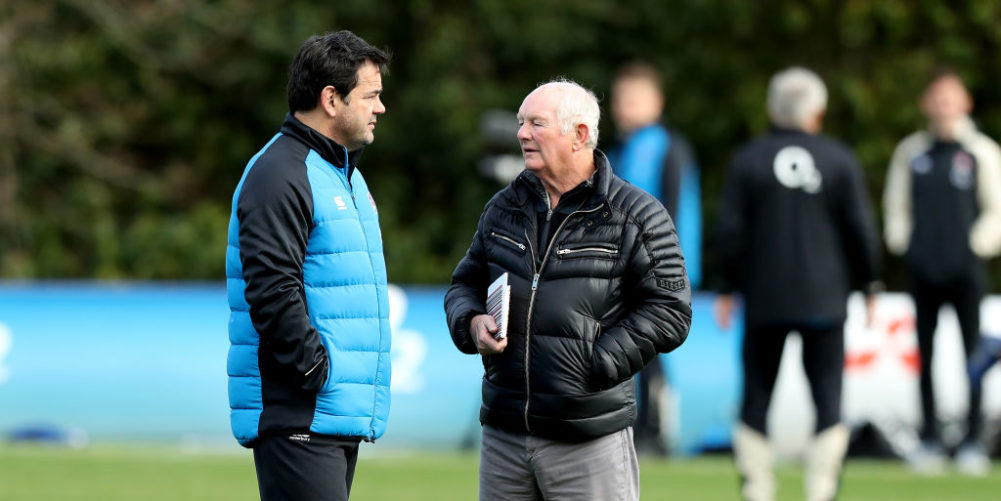Brian Ashton was not bitter when reflecting on his disappointing removal as England coach, although he did describe the sacking as a “bizarre episode”.
Ashton, now 75, was sacked in 2008, less than six months after guiding an England team ranked seventh in the World before the tournament to the 2007 World Cup Final.
But finding out he was likely to be fired before England’s final game of that Six Nations, a 33-10 thumping over Ireland, had evidently still left its mark on the legendary coach.
“When I look back, I could be really bitter and twisted if I wanted to be but I’m not,” he said on this week’s Rugby Paper Podcast.
“But I do look back at the England one especially, which was a really bizarre episode, because I found out two weeks before when it was announced in a national newspaper what was going to happen to me.”
Ashton replacement was Martin Johnson, a man who had never coached a professional team before and hasn’t since, and there was a sense from Ashton that he felt that he’d needed until the next World Cup to get the best out of the team.
He did acknowledge the importance of results from a game-by-game point of view, but having reached a World Cup final with a relatively weak team, and beating France in Paris twice in four months, he could be forgiven for feeling he’d done enough to retain the position for longer.
He added: “You’ve got to have an eye on the bigger picture, which for most international teams now, irrespective of what the fans might grumble about, is the World Cup.
“Of course you’ve got to focus on the present and try to get results, so it’s a combination of the short and medium term, because you can’t call four years long term.

“It’s always nice to know you’ve got support from the top, but it doesn’t always apply obviously.
“I’m 76 in a couple of weeks time and I understand now how life works, and that not everything goes the way you want it to go.”
One of the reasons why Ashton might well have deserved more time is the approach he tried to take with his players.
England had been heavily structured in the decade before Ashton took the helm, with tactically-focussed Clive Woodward and Andy Robinson his predecessors, but Ashton looked to give the players more autonomy.
When he got his players for a long stint, as he did in the lead up to the World Cup and tournament itself, results slowly but surely improved.
Having been hammered twice to South Africa on a summer tour where they conceded more than 50 points in both games, they were beaten 36-0 by the same opposition in the group stage.
But after battling past Pacific Islanders Tonga and then Samoa to progress, they beat the then world number two Australia, and then defeated France in Paris to reach a final against the Springboks.
This time they ultimately lost by a 15-6 margin, which could have been significantly closer had Mark Cueto not been denied a try by a matter of centimetres, but it showed the strides the team had made in the time the extended period they’d had with Ashton.
“I suppose in the 2007 World Cup there was a misinterpretation from some of the players, and possibly me, in terms of what we were trying to achieve and the way we operated, which was completely different to previous regimes.
“We’d been in the professional game for about ten years, and the analysts, statistics and data were beginning to have more and more impact, where I’ve always been one for a natural and gut feel about games.
“I spotted early on the image I had of how we wanted to play didn’t fit with the one the players had, they wanted to be more directed.
“But they managed to do it with encouragement, not direction, and to beat Australia in the quarter-final against all odds and beat France on their own territory, who had just beaten New Zealand, were two really good results.”
Asked what rule he’d change in the modern game, the attacking instincts of Ashton reared themselves as he suggested a reduction in the number of subs, which is widely believed to be a way of improving attacking play in the second period.
“I’d probably knock it down to five replacements maximum, a prop forward can play anything just above half a game, which is about 18 minutes of ball in play.
“So a guy trains all week and plays 18 minutes of sport, gets £250,000 a year and no-one questions it.”
For exclusive stories and all the detailed rugby news you need, subscribe to The Rugby Paper website, digital edition, or newspaper from as little as 14p a day.























